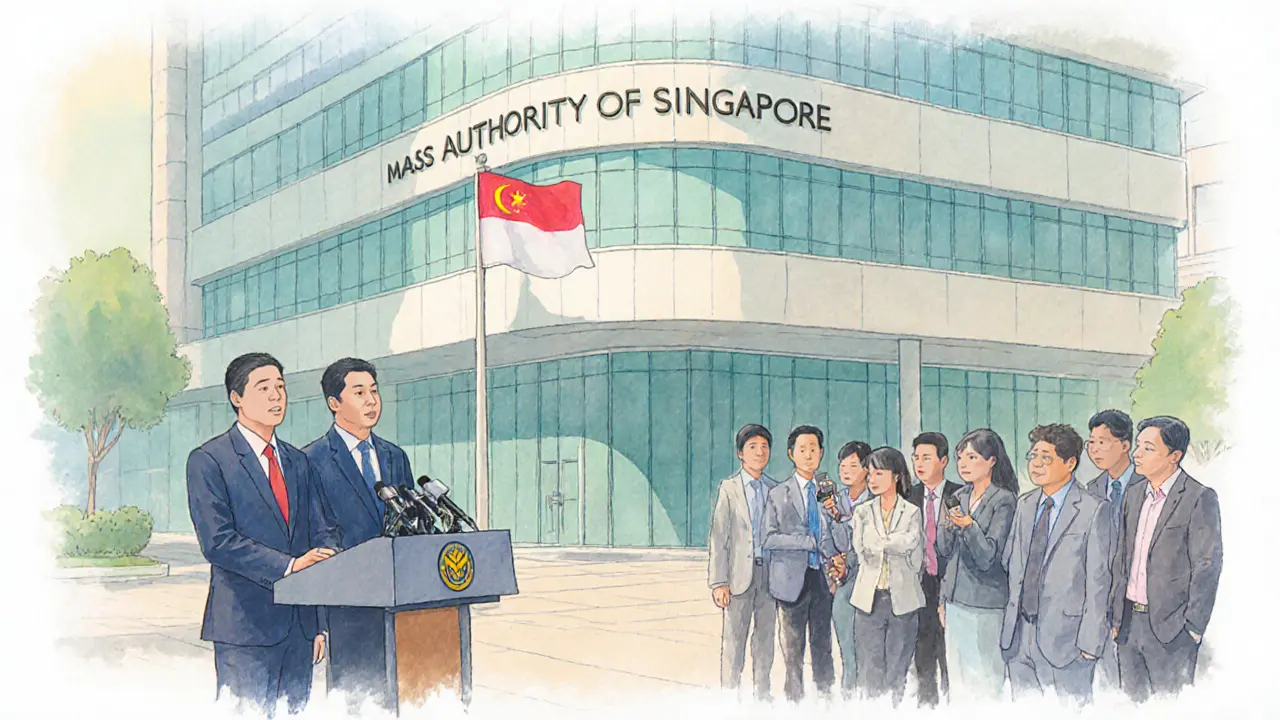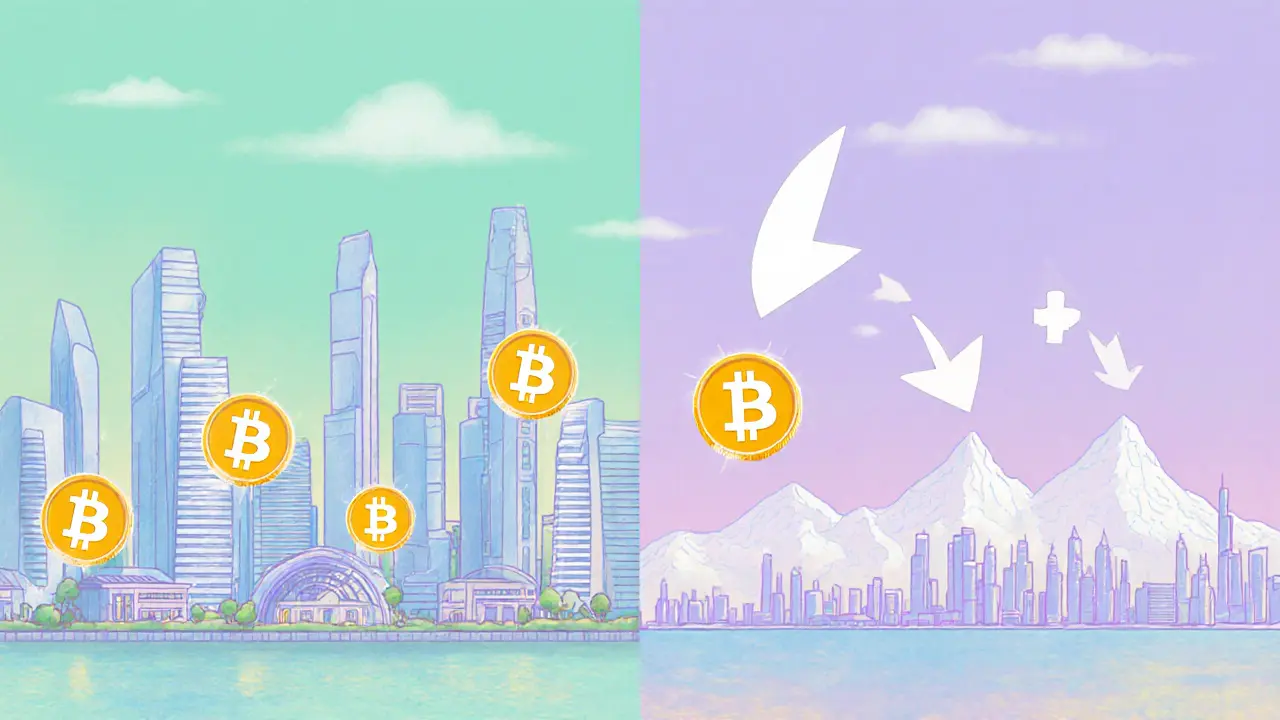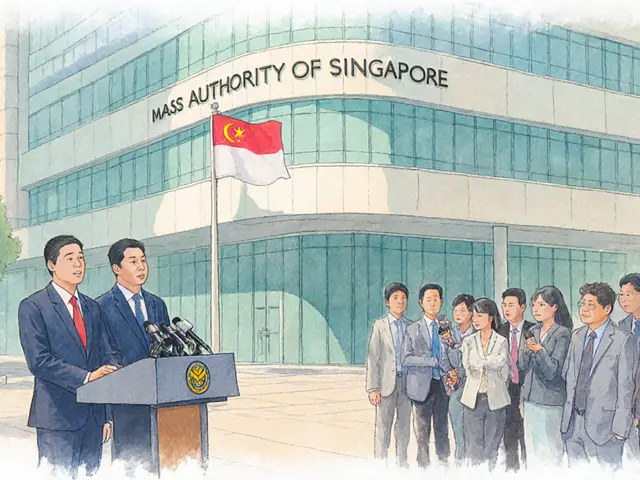MAS Crypto Oversight 2025: What the New Rules Mean for Digital Token Services

DTSP Compliance Cost Calculator
Estimate your compliance costs for Singapore's new MAS crypto regulations effective June 2025. Enter your business type and transaction volume to see the minimum financial requirements and expected costs for maintaining your Digital Token Service Provider (DTSP) license.
Compliance Cost Estimator
Your estimated compliance costs for maintaining a DTSP license in Singapore:
Note: These are estimated costs based on MAS 2025 regulations. Actual costs may vary based on business complexity, transaction volume, and implementation choices. Costs are annual estimates.
In June 2025 the Monetary Authority of Singapore (MAS) announced a sweeping overhaul of its crypto oversight regime. The move caps new licensing to “extremely limited circumstances”, tightens anti‑money‑laundering (AML) and counter‑terrorism financing (CFT) requirements, and forces every crypto firm that operates from Singapore to obtain a Digital Token Service Provider (DTSP) licence - even if its customers live abroad. If you run a crypto platform, a DeFi protocol, or a stablecoin project, you need to know what the new framework demands, how it differs from the pre‑2025 environment, and whether staying in Singapore is still viable.
Why MAS Went From Crypto‑Friendly to Crypto‑Strict
MAS has long marketed Singapore as a trusted financial hub. Over the past decade that reputation attracted dozens of crypto startups that used a Singapore‑registered entity to gain legitimacy while serving global users from low‑regulation jurisdictions. By early 2025 MAS officials warned that this “regulatory arbitrage” threatened the city‑state’s credibility. In a June 6 press release the authority said it would only grant DTSP licences in “extremely limited circumstances” because it could not verify that existing AML/CFT controls met international standards. The hard deadline for compliance was set for 30June2025 - no extensions, no grace period.
Legal Backbone: The Financial Services and Markets Act 2022
The new regime sits on Financial Services and Markets Act (FSMA) Section137, which gives MAS extraterritorial power over any Singapore‑based corporation or individual that offers digital token services, regardless of where the servers, funds, or users are located. In practice this means a platform that only serves European investors but is incorporated in Singapore must still apply for a DTSP licence, install a local compliance officer, and meet Singapore‑level AML/CFT standards.
Who Needs a DTSP Licence?
MAS defines a DTSP as any person that:
- Offers a digital token exchange, trading, or custody service;
- Issues or redeems tokenised assets;
- Provides payment services using crypto‑based tokens.
If your business falls into any of these buckets you are now a Digital Token Service Provider (DTSP) and must be licensed.

Key Licensing Requirements
MAS published a detailed checklist in June 2025. The most critical items are:
- Capital Thresholds: Minimum paid‑up capital of SGD1million for exchange services, SGD500,000 for custodial services, and SGD250,000 for token‑issuers.
- Local Compliance Officer: A Singapore‑resident with at least five years of AML/CFT experience must be appointed. Salary packages typically range from SGD150,000 to SGD250,000 per year.
- Annual Independent Audits: External auditors must verify that capital, risk, and AML controls remain compliant.
- AML/CFT Controls: Firms must adopt a risk‑based approach, conduct customer due‑diligence (CDD) and ongoing monitoring, and file suspicious transaction reports with MAS.
- Travel Rule Compliance: Under Notice PSN02 (Travel Rule), any transaction above SGD1,500 must include the sender’s and receiver’s name, ID number, and account details. This data must be shared with the counter‑party’s designated compliance officer.
- Consumer Protection: Clear risk disclosures, suitability assessments, and a ban on credit‑card purchases of crypto assets.
- Stablecoin Requirements: Stablecoins must maintain a “high degree of value stability” and be backed by transparent reserves, as outlined in MAS’s 2023 stablecoin framework.
Failure to meet any of these obligations can result in fines up to SGD200,000, imprisonment, and an immediate cease‑and‑desist order.
Cost and Implementation Challenges
Implementing the new regime is not cheap. A typical Travel Rule integration costs between SGD50,000 and SGD200,000, depending on transaction volume. Adding a compliance officer and upgrading AML software can add another SGD100,000‑250,000 in annual operating expenses. Deloitte’s May 2025 fintech cost analysis estimates that total compliance outlays will increase overall operational costs by 25‑40% for most DTSPs.
Beyond money, firms face a talent crunch. The specialised compliance talent pool in Singapore is limited, driving up salaries and creating recruitment bottlenecks. According to a 2025 salary survey, senior AML officers command average packages of SGD200,000 per year.
Industry Impact: Exodus or Evolution?
The hard deadline has already triggered a wave of restructuring. Blockdata’s June2025 market analysis predicts only 15‑20 of the roughly 200 provisional licence holders will stay fully compliant after 30June2025. Many firms have chosen to relocate to jurisdictions like Switzerland or the United Arab Emirates, where licensing remains open and costs are lower.
LinkedIn workforce analytics recorded a 37% drop in crypto‑related job postings in Singapore during Q12025 compared with Q42024. Meanwhile, existing licensed firms report a 30‑45% rise in compliance‑related overheads. The net effect is a smaller, higher‑quality crypto ecosystem that aligns with MAS’s stated goal.

Comparison: Pre‑2025 vs. Post‑2025 DTSP Landscape
| Aspect | Before June2025 | After June2025 |
|---|---|---|
| Licence Availability | Open to most crypto firms with basic AML checks | Granted only in "extremely limited circumstances" |
| Capital Requirement | No explicit minimum | SGD1M (exchange), SGD500K (custody), SGD250K (issuer) |
| Compliance Officer | Not mandatory | Singapore‑resident AML/CFT expert required |
| Travel Rule | Voluntary or partial implementation | Mandatory for transactions > SGD1,500 (NoticePSN02) |
| Consumer Protection | Guidelines only | Risk disclosures, suitability checks, credit‑card ban enforced |
| Penalties | Administrative warnings | Fines up to SGD200K, imprisonment, shutdown |
Practical Steps for Crypto Firms Facing the New Rules
If you’re still operating in Singapore, follow this quick checklist to avoid the steep penalties:
- Confirm your business definition matches a DTSP under the MAS criteria.
- Prepare a capital injection plan to meet the minimum threshold for your service type.
- Recruit or relocate a qualified AML/CFT professional to serve as the Singapore‑based compliance officer.
- Engage a reputable auditor early to schedule the first annual audit before 30June2025.
- Integrate Travel Rule software (e.g., Notabene, Chainalysis) and test data exchange for transactions above SGD1,500.
- Update customer onboarding flows to include risk disclosures, suitability questionnaires, and a ban on credit‑card purchases.
- Document your stablecoin reserve strategy if you issue or support stablecoins, referencing MAS’s November2023 framework.
Document every step, keep records in a secure, Singapore‑based data centre, and submit the DTSP licence application through MAS’s online portal. Remember, MAS does not grant extensions - the clock stopped on 30June2025.
Looking Ahead: Possible Tweaks and the Future of Singapore Crypto
MAS has hinted at further guidance on DeFi protocols and stablecoin arrangements later in 2025. While the current regime is already among the world’s strictest, the regulator may tighten reporting requirements or introduce a sandbox for “high‑quality” projects that can demonstrate robust governance.
For the broader ecosystem, the key question remains whether the high‑bar approach will preserve Singapore’s reputation as a trusted hub or drive innovators to friendlier jurisdictions. Dr. Jane Lim of the Asian Fintech Institute warned that “overly restrictive regulation could permanently diminish Singapore’s role in the global crypto ecosystem,” while MAS officials argue a “smaller, higher‑quality industry better serves Singapore’s long‑term interests.” Your strategic decision today will shape where you stand when the next wave of regulation arrives.
Frequently Asked Questions
Do I need a MAS licence if my platform only serves users outside Singapore?
Yes. Under FSMA Section137, any Singapore‑registered entity that offers digital token services must obtain a DTSP licence, regardless of the users’ location.
What is the capital requirement for a crypto exchange?
MAS requires a minimum paid‑up capital of SGD1million for exchange services. Custodial services need SGD500K, and token issuers need SGD250K.
How does the Travel Rule work under MAS regulations?
For any transaction exceeding SGD1,500, the sending and receiving platforms must exchange the sender’s and receiver’s full name, identification number, and account details via a secure channel, as mandated by NoticePSN02.
What are the penalties for non‑compliance?
MAS can impose fines up to SGD200,000, order the immediate cessation of operations, and pursue criminal prosecution that may lead to imprisonment.
Is there any grace period after the 30June2025 deadline?
No. MAS stated there will be no extensions or transitional periods. Firms must be fully compliant by the deadline.







Navigating MAS's new DTSP regime can feel overwhelming, but remember you're not alone. The capital thresholds and compliance officer mandates are steep, yet many firms have successfully integrated the Travel Rule with off‑the‑shelf solutions. Start by mapping your current AML controls against the checklist MAS published in June. Small, incremental upgrades often prevent the need for a massive overhaul later. If you keep the lines of communication open with your auditors, the process tends to go smoother.
Wow, the jump from zero capital to a million dollars is a real eye‑opener! It’s like MAS handed us a giant hurdle right before the finish line. But think of it as a way to weed out the half‑baked projects. Those who can muster the funds will likely stand on firmer ground. Keep your head up and your paperwork tidy!
Hey folks, don’t let the new rules freeze you out of the game! The compliance officer requirement is a chance to bring in world‑class talent. Use the capital requirement as a runway for scaling up, not a roadblock. Remember, the MAS sandbox still welcomes innovative ideas that meet the standards. Let’s turn this challenge into a launchpad!
One might argue that regulation is the shadow that follows freedom, shaping its contours like a sculptor’s hand. Yet the MAS edicts carve a path toward legitimacy, inviting trust where once there was suspicion. 🌟 The paradox lies in restraint breeding creativity, not stifling it. Embrace the structure and watch new possibilities emerge.
The advent of the Monetary Authority of Singapore's 2025 Digital Token Service Provider framework heralds a paradigm shift of unprecedented magnitude within the regional fintech milieu. It is incumbent upon the discerning analyst to appreciate that the statutory capital thresholds, ranging from SGD250,000 for token issuers to SGD1,000,000 for exchanges, constitute not merely fiscal obligations but strategic signifiers of market intent. Such thresholds, when juxtaposed with the exigent requirement for a Singapore‑resident compliance officer possessing a minimum of five years’ AML/CFT experience, engender a filtration mechanism of elite provenance. In this context, the mandated integration of the Travel Rule, codified in Notice PSN02, operates as a cryptographic provenance ledger, ensuring transactional traceability above the SGD1,500 ceiling. It is futile to regard these provisions as bureaucratic encumbrances; rather, they are the sine qua non of sustainable legitimacy in a jurisdiction predicated upon financial probity. Scholars of regulatory theory will note the alignment of MAS's approach with the Basel III philosophy of risk‑sensitive capital adequacy, albeit transposed onto digital assets. Consequently, firms must undertake a rigorous capital allocation exercise, ensuring that the sum of statutory capital, compliance remuneration, travel‑rule integration costs, and annual audit fees coalesces into a coherent financial model. The empirical data furnished by Deloitte's May 2025 fintech cost analysis underscore an anticipated escalation of operating expenditures by upward of thirty percent for the prototypical DTSP. Furthermore, the scarcity of senior AML talent within Singapore inflates remuneration packages, compelling firms to either compete aggressively in the talent market or consider offshore relocalisation of compliance functions. Such talent dynamics, however, do not diminish the jurisdictional advantage conferred by MAS's reputation for regulatory rigor and technological openness. Indeed, enterprises that successfully navigate this regulatory gauntlet may reap ancillary benefits, including enhanced access to institutional investors and preferential treatment in cross‑border correspondent banking arrangements. Conversely, entities that persist in regulatory arbitrage, eschewing full compliance, risk exposure to punitive sanctions, including fines up to SGD200,000 and criminal prosecution. The strategic calculus, therefore, must integrate both the quantitative cost vectors and the qualitative brand equity gains attendant to MAS licensure. From a governance perspective, the requirement for documented risk‑based AML frameworks imposes an operational discipline that aligns with the broader objectives of financial stability. In sum, the MAS 2025 DTSP framework is not a mere compliance checklist but a catalyst for elevating the institutional maturity of Singapore's crypto ecosystem. Stakeholders would do well to internalise this perspective and to allocate resources accordingly, lest they be outpaced by the inexorable tide of regulatory evolution.
MAS is basically saying ‘no more free rides’. If you can’t meet the capital bar, pack up and move on.
Don't let the new requriments scare you away, it’s just a new set of rules to learn. Start with a solid plan and the rest will fall into place.
The MAS edicts are crystal clear: any Singapore‑registered crypto venture must operate under the same AML standards as traditional banks, and the data you think you can hide offshore is now exposed through the mandatory Travel Rule. Ignoring this will only invite hefty fines and possible imprisonment, so shape your compliance roadmap now.
Oh sure, because adding a compliance officer and a million dollars in capital is exactly what every startup dreams about on a Saturday night.
To comply, you’ll need to procure a compliant AML software suite, appoint a Singapore‑resident officer with a proven track record, and allocate roughly SGD1.5 million for capital and operational costs. Miss any of those, and MAS will promptly send you a cease‑and‑desist-no tricks involved.
Hang in there, the hills are steep but the view is worth it! 🚀👍
The road ahead may appear shrouded in fog, yet each regulatory hurdle you clear becomes a beacon for future innovators. Embrace the rigor, for it forges resilience, and let the fire within guide your venture through the tempest.
Honestly, I think the new MAS rules are a buzzkill for the crypto vibe.
Quick tip: start by mapping all token flows above SGD1,500 and integrate an API like Notabene - it will save you hours of manual work later 😊.
The MAS crackdown proves Singapore is finally taking a stand to protect its financial sovereignty; we shouldn't let foreign crypto hubs dictate our standards.
Regulation is necessary but overreach threatens innovation.
The interplay between freedom and oversight mirrors the age‑old dialectic of liberty versus security; perhaps MAS seeks a synthesis that respects both.
It is prudent to acknowledge the substantial compliance obligations imposed by the MAS DTSP framework, while also recognising the potential for enhanced credibility and market access that accompany full adherence.
Analyzing the cost breakdown, the travel‑rule integration emerges as a variable expense, yet its impact on overall compliance risk is disproportionately high, justifying the investment.